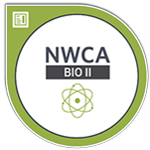PURPOSE
The Biology II credential is one of two credentials that together document the essential competencies for general biology competencies including basic chemistry concepts, cell structure and function, basic genetic concepts, developmental biology and evolution theories, plant and animal diversity concepts, and plant and animal physiology.
AUDIENCE
This credential is appropriate for biology professionals including biologists, biological technicians, agricultural and food scientists and technicians, environmental science and protection scientists and technician, microbiologists, ecologists, zoologists and wildlife biologists, conservationists, foresters, and others working or teaching in biological areas.
JOB/CAREER REQUIREMENTS
Biology credentials signify a general understanding of biological concepts including chemistry for life sciences, the structure and function of plant and animal cells, genetics, evolution theories, plant and animal biodiversity concepts, and plant and animal anatomy and physiology concepts. Biologists and related professionals typically require at least a bachelor’s degree. Many positions require graduate degrees in biology or specialized areas. They require solid skills in communication, critical-thinking, interpersonal skills, observation skills, and problem-solving skills. For many positions they must be comfortable working in the outdoors, often independently and in all weather conditions. Other positions require laboratory work.
BIOLOGY WORKPLACE TASKS:
- All types of biologists develop and conduct research studies on plants and/or animals and report on findings
- They often collect a variety of research data on plants, animals, and the environment
- They often study the characteristics and relationships of plants and animals and their impact on humans
- They often study the impact of humans on plants and animals
- They sometimes estimate, monitor, and manage wildlife populations or plant environments
- Conservation scientists and foresters study environmental habitats to assure compliance with environmental regulations, monitor health and other activities, work with stakeholders to improve land areas, and develop and implement conservation plans
- Biological technicians assist biologists in conducting experiments in the field and in lab environments
- Environmental scientists and ecologists work to protect the environment and human health
EXAM STRUCTURE OVERVIEW
Number of Questions in Exam: 105
Total Time: 90 minutes
Overall Passing Score: 70%
(All sections require an individual passing score of 70%)

